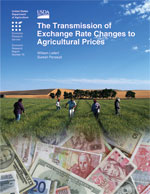Economic Research Report No. (ERR-76) 33 pp
The Transmission of Exchange Rate Changes to Agricultural Prices
Movements in countries' exchange rates can substantially change the prices of goods faced by producers and consumers and thereby affect incentives to produce, consume, and trade goods. Exchange rate changes, however, might not be completely transmitted (passed through) to domestic prices. Empirical evidence shows that price and exchange rate transmission for agricultural products is low in most developing economies, partly because of trade policies but also because of inadequate infrastructure and other market deficiencies. During the last 20 years, developed and developing countries generally have moved away from support policies that impede price and exchange rate transmission toward trade policies that allow transmission, such as tariffs. The Uruguay Round Agreement on Agriculture of 1994 strongly encouraged this development. Despite these policy changes, market deficiencies remain as a cause of incomplete transmission. Incomplete transmission weakens countries' integration into world agricultural markets and thereby reduces agricultural trade potential. Low transmission in developing countries also decreases their own benefits from trade, including the gains they could realize if there is further global agricultural liberalization.
Keywords: Agricultural infrastructure, agricultural policy, agricultural trade, exchange rates, exchange rate transmission, imperfect markets, institutions, price transmission
In this publication...


